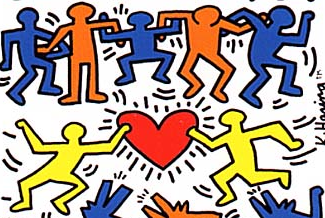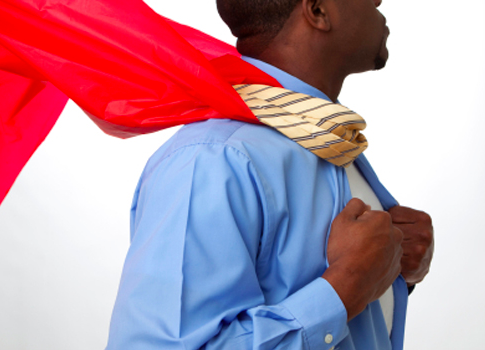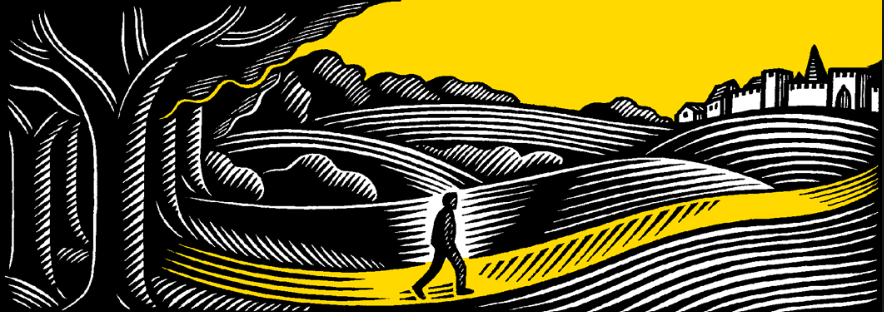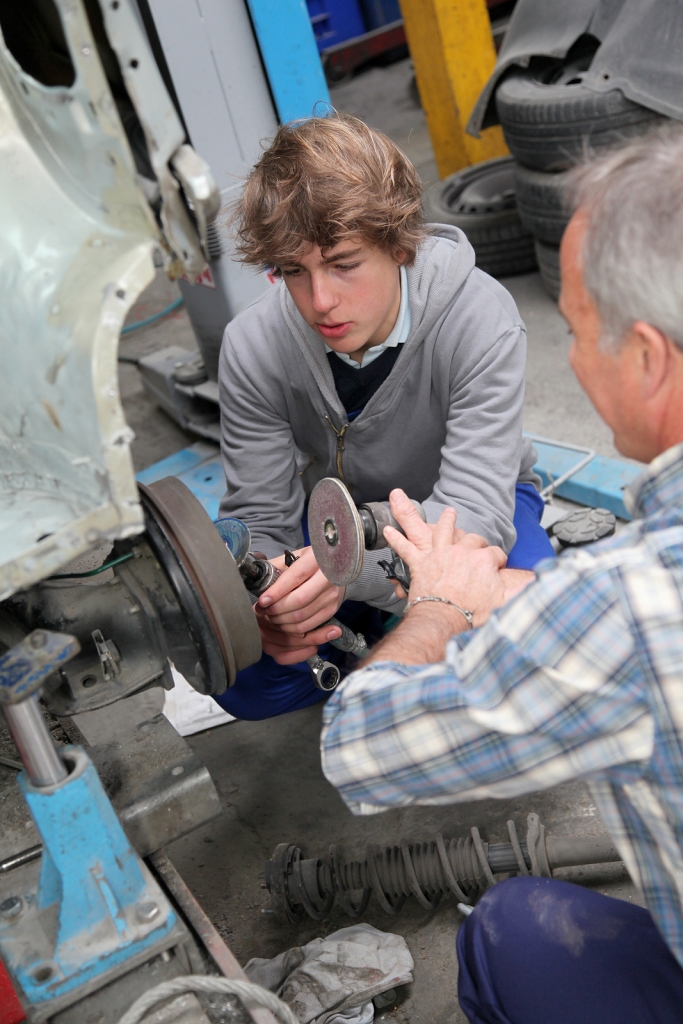The importance of inspiring hope
Podcast: Play in new window | Download
This month, Amachi Vice President Muna Walker, has shared her own match story and the importance of inspiring “hope” when mentoring.
 In December 2004 when Big Brothers Big Sisters of Bucks County matched me with my 14 year-old Little Sister, Desiree, I had no idea it was the beginning of a lifetime friendship. I had recently been hired by Public/Private Ventures (P/PV) to assist Dr. W. Wilson Goode, Sr. with providing training and technical assistance to Amachi programs nationwide, a mentoring program modeled after Big Brothers Big Sisters. I wondered how I could possibly travel the country extolling the power of mentoring without ever having been one myself. So I decided to try it out. My only goal was to meet the basic requirements of spending one hour once a week for a year with my mentee. I cannot imagine what Desiree’s life or mine would have been like had our relationship ended after only a year.
In December 2004 when Big Brothers Big Sisters of Bucks County matched me with my 14 year-old Little Sister, Desiree, I had no idea it was the beginning of a lifetime friendship. I had recently been hired by Public/Private Ventures (P/PV) to assist Dr. W. Wilson Goode, Sr. with providing training and technical assistance to Amachi programs nationwide, a mentoring program modeled after Big Brothers Big Sisters. I wondered how I could possibly travel the country extolling the power of mentoring without ever having been one myself. So I decided to try it out. My only goal was to meet the basic requirements of spending one hour once a week for a year with my mentee. I cannot imagine what Desiree’s life or mine would have been like had our relationship ended after only a year.
Most mentoring programs aim for matches to last well beyond the minimum one year agreement and hope to create lifetime relationships. Several studies suggest that youth with the longest matches receive the most benefits from mentoring (Curtis & Hansen-Schwoebel, 1999; Grossman & Rhodes, 2002; Herrera, 2004). There are many factors that determine match longevity. A critical component that helped extend my match was excellent case management. Our match could have easily ended after just a year or two, but our case manager helped us navigate our challenges at critical junctures. So by the time I relocated back to the Chicago area in 2008 and our match formally terminated, our relationship was rock solid. In the recent report, The Role of Risk: Mentoring Experience and Outcomes for Youth with Varying Risk Profiles (Herrera, DuBois, Grossman, 2013), a preliminary study shows “both case manager competence and the support they provide likely contribute to higher levels of youth-centered and goal/growth-focused mentoring interactions, greater closeness experienced by youth and longer matches.”
After my move, I mentored Desiree remotely during her senior year of high school, and assisted her with the college application process. Not only did she gain admission to a four-year university, she earned a scholarship. I thought I rarely would be needed after she went to college. The exact opposite turned out to be true.
At the time, I did not know the poor odds Desiree faced for actually graduating college. I was unfamiliar with the research on postsecondary success for first-generation college students. Unfortunately, by the second semester of Desiree’s freshman year, she started having financial struggles, family issues, serious health problems, and could not complete the year. These challenges erupted sporadically for the next two and a half years. In February 2012, Desiree had a near fatal car accident which forced her to leave college again. By this point she owed thousands of dollars for college and hospital expenses and decided it was financially infeasible to remain in school. Desiree was devastated and saw no hope for her future. I asked her to just maintain a little bit of hope that life would get better. If she did that, I would work tirelessly to help her get back in school and realize her dream of becoming a nurse.
I scoured the Internet for nursing programs and found a community college which partnered with four-year universities where upon completion of an Associate’s Degree, qualified students could enter the universities’ nursing program. This opportunity gave Desiree a glimmer of hope as she buckled down and began classes. However, her challenges increased in January 2013 after being diagnosed with Type 1 diabetes and lupus, and losing her health insurance.
Last summer Desiree had another brush with death when her blood sugar level reached 739 and she passed out on her kitchen floor. Thankfully her landlord found her in time. When Desiree left the hospital, I sent her the money needed for a month’s supply of insulin. I had been helping Desiree with her school and living expenses and was facing my own financial challenges, and she had not wanted to tell me that she could no longer afford her medicine.
Summer 2013 proved to be truly amazing. After nearly dying, Desiree got the chance to create the life of her dreams. She had applied to the University of Pennsylvania’s School of Nursing with the enduring hope that maybe she would be accepted. Two weeks before classes were to begin, Desiree received a call that someone had dropped out of the program and she was next on the waitlist. I encouraged Desiree to always remember that moment, and continuously have hope in her unseen future even when her dreams seem impossible.
I reminded Desiree of that hope when she told me this past Fall that she did not know if she could finish the program. She was tackling her most difficult academic work to date while holding a demanding job and managing her chronic health conditions. I insisted she speak only positive thoughts. I assured her that if she kept her mind focused on graduation day, I would make certain she had the help she needed to get there. I was fully confident in her ability to be the first in her family to earn a college degree. She just needed some on-site support. I called Dr. Goode and explained Desiree’s circumstances. He had never met Desiree but had heard my numerous stories of her triumphs and trials.
The next day, Dr. Goode instructed me to give Desiree the contact information for Delores Brisbon. After their first meeting, Desiree sent me the text, “You are a blessing to me in every single way. I will call you later on to talk. I love you.” My heart jumped with joy. When I passed along Ms. Brisbon’s contact information, I did not know the depths of her personal story. I knew she had been the first African American Chief Operating Officer at the University of Pennsylvania Hospital, but I had not realized all that she had overcome. There was no better time for the two women to meet, and their encounter provided the exact motivation and inspiration that Desiree needed. I explained to Desiree that this was another example of why she must always have hope. There is just no way of seeing what blessings are around the corner.
Upon reflection on the last nine years with Desiree, I have realized that my words of encouragement throughout our relationship were just as much for me as for Desiree. For years I had urged her to maintain hope regardless of her situation, but I sometimes neglected my own advice. Finally, I made the conscious choice to not just advise Desiree on how to handle life’s situations but to be her example. I have realized that good case management helped our match last, but Desiree has received the most mentoring benefits from my ability to assist her in maintaining hope in her future. Findings discussed in Research Corner: Making Mentoring Work (Rhodes 2002) show that “irrespective of the mentoring program setting or type, it is the quality of the relationships that are forged and the degree to which they inspire hope that are at the heart of change. From this perspective, the activities and strategies that mentors use are the “rituals” that facilitate the formation of close relationships and trigger expectations for positive change.” In a recent email, Desiree told me, “Thanks for being patient with me. I love you. You’re the absolute best, and your words and stable support are why I’m still trucking.”
Muna A. Walker, Vice President, Amachi, Inc.













